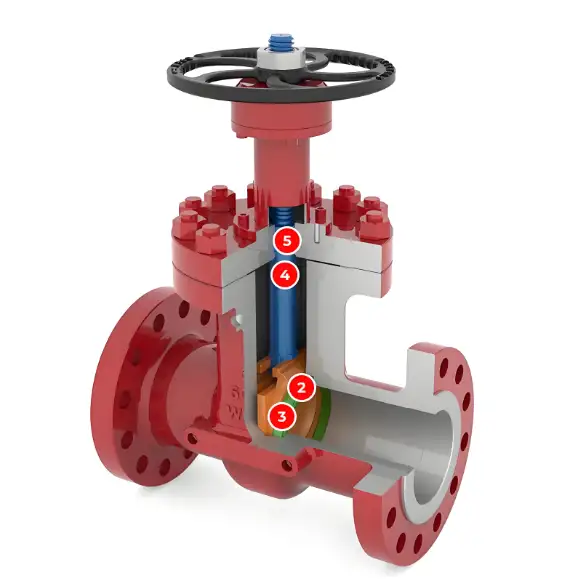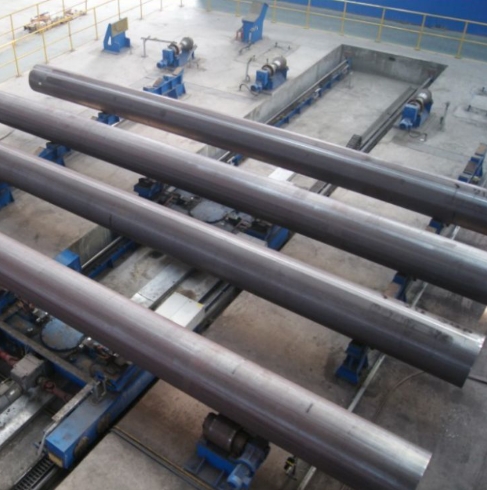In 2025 the landed spot price for API Spec 5L pipeline steel coil typically sits between ~USD 500/ton and USD 1,000/ton depending on grade (e.g., Grade B / X52 / X60), product form (hot-rolled coil, coated, welded vs. seamless), and the buyer’s region and order size. China-plate and domestic coil tends to trade at the lower end (examples around USD ~500–600/ton for simple PSL1 Grade B coils in several Chinese spot reports), while coil used for high-strength X52–X70 linepipe or where value-added processing (coating, thermo-mechanical rolling) is required, commands a premium and can push prices toward the upper range.
We observe three practical price bands in 2025 for API 5L coil:
-
Commodity coil (PSL1, Grade B, plain hot-rolled): typically ~USD 500–650/ton in China spot markets.
-
Mid-strength coils (X42–X52, PSL1/PSL2, standard welding prep): ~USD 700–900/ton in many export markets when HRC indices are elevated.
-
High-performance coils (X60–X70, PSL2, sour/offshore grades, coated/thermo-mechanically processed): can exceed USD 1,000/ton delivered, depending on coatings and additional tests.
Recommendation (practical): specify the minimum mechanical & chemistry you need (avoid over-specifying tests if service doesn’t require them), bundle larger volumes, and consider factory direct suppliers (like Luokaiwei) for better unit economics and fast stock delivery.
What is API Spec 5L and why it matters
API Specification 5L is the principal industry standard covering the manufacture of line pipe — both seamless and welded — for transporting gas, oil and water. The standard defines two product specification levels (PSL1 and PSL2), allowable chemistry ranges, mechanical properties, testing and marking. Compliance with API 5L ensures the material is acceptable in many pipeline projects and is referenced by regulatory authorities in some jurisdictions.
Why this affects price: higher PSL level, stricter chemistry limits, additional impact testing, or sour-service annexes all increase production complexity and inspection overhead — and therefore the cost.
PSL1 vs PSL2, and common grade designations
-
PSL1: basic commercial requirements, suited for many water and non-critical gas lines. Lower test burden.
-
PSL2: enhanced traceability, tighter chemical and mechanical limits, mandatory Charpy or equivalent toughness testing for some grades, and supplemental NDT/inspection. Thus PSL2 is more expensive to produce.
Common grade names you’ll see: Grade B, X42, X46, X52, X56, X60, X70. As grade tensile strength and yield increase, processing and inspection become more exacting — this feeds into price.

Coil forms and manufacturing routes
API 5L coil commonly appears as hot-rolled coil (HRC) which then goes to pipe mills (ERW, SAW, spiral) to produce welded linepipe. Seamless pipe originates from billets/tubes and is usually more costly than welded solutions for the same diameter/thickness, especially in small batch sizes. Choosing coil for welded pipe (ERW/LSAW) generally lowers per-ton cost compared with seamless pipe for comparable sizes.
Mechanical / chemical requirements that affect cost
Key chemistry elements (C, Mn, P, S, Si, Nb, V, Ti) and heat-treatment determine weldability and toughness. Tight carbon equivalents or low sulfur/phosphorus require better steelmaking control, increasing core cost.
Important mechanical parameters: yield strength (YS), tensile strength (TS), elongation, and toughness (Charpy V-notch). If your project requires low-temperature toughness or high YS/TS ratios, expect added testing and potential thermo-mechanical rolling (TMCP) steps that raise price.
Coatings, linings, and value-added processing
Coatings such as 3LPE/3LPP, FBE, internal concrete lining, or bituminous coatings materially increase costs. So do mechanical end processing (beveling), shot blasting, and preservation for long transits.
Example: adding a 3LPE external coating and internal FBE lining will add several hundred USD/ton in finished pipe cost versus uncoated coil because of material, curing, and handling. Always ask suppliers to price coating lines separately so you can see the component costs.
Key tests & inspection that add cost
Mandatory or project-required tests that increase unit price:
-
Full chemical analysis and mill test certificates (MTC).
-
Charpy impact testing (especially for PSL2 or low-temperature service).
-
Non-destructive testing (UT/eddy current) on tube/pipe after welding.
-
Positive Material Identification (PMI) when alloying elements are critical.
-
Third-party inspection (TPI) witness: adds inspector fees and coordination complexity.
Many buyers drop unnecessary tests when risk is low; that’s an effective way to reduce cost.
2025 market drivers for price (what pushed prices this year)
Several factors dominate 2025 pricing for API 5L coil:
-
Hot-rolled coil (HRC) base price movements — HRC index shifts set the floor for coil costs. Global HRC indices were elevated through early-mid 2025 and softened later in the summer; these swings map closely to coil quotes.
-
Raw material (scrap, iron ore) and energy costs — mill operating costs move with electricity and coking coal prices.
-
Freight & logistics — ocean freight spikes or port congestion change CIF prices rapidly.
-
Policy and supply constraints — export controls, anti-dumping duties, or capacity outages drive regional divergences.
Because these drivers are fluid, buyers should request fresh quotations dated within 7–14 days for large purchases.
Global price comparison
Note: numbers are indicative based on dated spot reports and market indices. They should be used for budgeting and comparison rather than as definitive instantaneous quotes.
| Region | Representative 2025 spot price (USD / ton, coil) | Typical notes |
|---|---|---|
| China (domestic coil, simple PSL1 Grade B) | USD 500 – 650 / t | Several Chinese spot reports in mid-2025 show Grade B coils ~USD 510/t in late May. |
| India (domestic HRC & coil) | USD 550 – 800 / t | Local taxes and freight to port can widen spread; domestic mills set base. |
| United States (HRC-linked coil, higher logistic cost) | USD 800 – 980 / t | HRC indices and domestic mill base prices in mid-2025 averaged higher than China. |
| Europe (HRC linked) | USD 780 – 950 / t | European index follows HRC and energy costs; duties on some imports apply. |
| Middle East / GCC (importers) | USD 720 – 1,000 / t CIF | Major buyers import coils/coated pipes depending on local projects; freights shift final CIF price. |
Sources used for ranges: Chinese spot reports and HRC index providers. These capture the broad spread buyers can expect in 2025.
How we price and deliver
We are a factory-level producer in China that supplies API 5L coils and processed linepipe. Key advantages we emphasize to buyers:
-
Factory pricing: because we control production, we offer competitive ex-works (EXW) or FOB pricing without distributor markups — this often results in a 100% factory-price advantage versus multi-layered trading channels. (Buyer should compare like-for-like — same grade, same tests.)
-
Customization: we support custom thicknesses, grades, and coatings. For volume orders we can set up dedicated production runs to meet PSL2 traceability.
-
Fast delivery for stock items: maintain rolling inventory of common grades (Grade B, X42, X52) for the quickest lead times.
-
Export experience & documentation: full MTCs, PMI, TPI coordination and packing for long sea voyages.
Commercial tip: ask the supplier to itemize the offer (coil cost, testing, coating, packing, freight) — that makes apples-to-apples evaluation easier.
Buyer’s technical + commercial RFQ checklist
When requesting quotations, include:
Technical
-
API 5L edition and PSL level (e.g., API Spec 5L 46th edition, PSL2) and required grade.
-
Chemical composition limits and max CE (Carbon Equivalent) if needed.
-
Required mechanical properties (YS, TS, elongation, Charpy temperature).
-
Coating/lining specifics (3LPE thickness, FBE type, etc.).
-
Surface finish, beveling, ends, and packing requirements.
Commercial
-
Requested quantity (tons) and delivery terms (EXW/FOB/CIF).
-
Incoterms and port of discharge.
-
Inspection requirements (TPI witness? inspector company?).
-
Delivery schedule and payment terms (LC at sight, TT, open account).
-
Warranty and non-conformance handling.
A complete RFQ avoids hidden costs and encourages transparent quotes.
Example cost build-up
Below is a simplified example for budgeting only (example for 500 t PSL1 Grade B coils shipped EXW China):
-
Hot-rolled coil base (raw coil): USD 510 / t (China spot figure, May 2025).
-
Mill processing and slitting/packing: USD 20 – 35 / t
-
MTC & basic testing: USD 5 – 15 / t
-
Coating / value addition (if required): USD 100 – 300 / t (varies by coating)
-
EXW factory price (bundle): ~USD 550 – 860 / t depending on additions.
-
FOB/CIF adds freight, port fees, duties — buyer should request itemized freight and insurance.
This illustration shows why simple PSL1 coils can be significantly cheaper than coated/high-strength coils.
Case study — 500-ton sample quote
Scenario: Buyer requests 500 t of API 5L PSL1 Grade B hot-rolled coil, plain (no coating), EXW China.
-
Coil base price: USD 510/t → 500 t = USD 255,000.
-
Slitting/packing/inspection: USD 25/t → 500 t = USD 12,500.
-
Documentation & MTC: USD 8/t → 500 t = USD 4,000.
-
Estimated EXW total = USD 271,500 → ~USD 543 / t.
If the buyer instead requires PSL2 with Charpy testing and 3LPE coating, add roughly USD 120–320/t depending on the test frequency and coating specification.
Practical procurement tips to reduce total landed cost
-
Consolidate orders to amortize testing and freight.
-
Remove non-essential tests for non-critical service.
-
Ask factories for rolling stock availability when urgent.
-
Compare FOB vs CIF: sometimes FOB + freight negotiation by buyer is cheaper.
-
For long projects, negotiate price-escalation clauses linked to HRC index or a specified raw-material formula.
FAQs
Q1 — What is the cheapest way to buy API 5L coil?
A — Purchase standard PSL1 Grade B hot-rolled coil in bulk from a factory supplier and accept EXW or FOB terms. Avoid coatings/tests you don’t need. (Example Chinese spot prices can be markedly lower than domestic HRC in the US/EU.)
Q2 — How much extra does PSL2 add to price vs PSL1?
A — PSL2 typically adds costs due to extra testing, traceability and potential additional heat-treatment. The premium varies but expect a few tens to a few hundreds of USD/ton depending on grade and testing intensity.
Q3 — Should I buy coated pipe or coil + local coating?
A — If your project requires consistent, factory-applied 3LPE/3LPP or FBE, factory coating is usually higher quality. But local coating may offer savings if logistics or customs make factory coating expensive. Get both quotes to compare.
Q4 — How fast can a factory deliver stock coils?
A — For common grades in stock, we can typically prepare shipment documentation and load within days to a few weeks depending on order size and port slots. Custom grades take longer for production and testing.
Q5 — How do HRC price movements affect my contract?
A — HRC indices are the main driver for coil cost. For long projects, include a clear escalation formula or price validity period to avoid large unexpected swings. Use indexed clauses tied to reputable HRC price providers.








